A small press dedicated to publishing original works by fanfiction authors. We blog about our projects, writing, queer publishing, calls for story submissions, and ducks.
Don't wanna be here? Send us removal request.
Text

Two Mandarin Ducks, Utagawa Hiroshige
17 notes
·
View notes
Text
#polls#oh wow this is incredibly hard#i'm going with jo march tho#I mean look at her#she will rise awesomely to any occasion
133 notes
·
View notes
Text
Get queer ebooks on sale! Giant Space Wizard Science Fantasy publisher’s sale
Gay books
Sapphic books
Trans books
Lesbians in space
The list goes on

Including my sapphic fantasy romance adventure, Tavern Tale! For 0.99!
Inspired by RPGs and set in cozy autumn. Saph will help Divine find her missing talisman if Divine will help her with a quest in a chest. Like DND with your friends.


Most books are on sale from $0.99 to $1.99, from August 20 to 26.
The Space Wizard Sale (20 to 26) is happening here: https://authorsxp.com/spotlight/spacewizard/index4.html
The Naratess sale (23 to 25) is happening here: https://indiebook.sale/

14 notes
·
View notes
Text


Please refer to the pinned post for more information.
Prompts available in regular text below!
Comfy-vember 2025 - Prompt lists
PROMPT OF THE MONTH:
Talking at night – Hug from behind
"Thank you."
Song: "You'll Be In My Heart" by Phil Collins
----
WEEKLY PROMPTS:
Week 1:
Long walk – Protective instincts
"I know you do."
Week 2:
Ugly crying – Pick-a-back ride
"I just wish you would have told me
Week 3:
Noisy party – Bear hug
"I made it for you."
Week 4:
Bandages – Fuzzy socks
"Just stay with me?"
----
DAILY PROMPTS:
Day 1: Sunrise
Day 2: Anniversary
Day 3: Smell of home
Day 4: Sleeping on the couch
Day 5: Cool cloth
Day 6: Heartfelt letter
Day 7: Adopted pet
Day 8: Blue sky
Day 9: Sharing secrets
Day 10: Cutting hair
Day 11: Starry night
Day 12: Shelter
Day 13: Hot drink
Day 14: Surprise party
Day 15: Favourite TV show
Day 16: Talking at night
Day 17: Used bookshop
Day 18: Old shirt
Day 19: New tradition
Day 20: Full stomach
Day 21: Sweet dreams
Day 22: Heartbeat
Day 23: Hug from behind
Day 24: Snow/beach day
Day 25: Music on the radio
Day 26: Surprise reunion
Day 27: Forehead touch
Day 28: Washing dishes together
Day 29: Pain relief
Day 30: Homemade cake
178 notes
·
View notes
Text
*What the they ask = if they want to download the work to their device and/or if they want to print it out
This poll was submitted to us and we simply posted it so people could vote and discuss their opinions on the matter. If you’d like for us to ask the internet a question for you, feel free to drop the poll of your choice in our inbox and we’ll post them anonymously (for more info, please check our pinned post).
#polls#polls for writers#i'd prefer people ask before printing#but in the end i'm a product of the old web#it's not like i can stop people so i might as well be okay with it#anyway ao3 includes functionality for easy downloading#of course people are gonna use it
342 notes
·
View notes
Text
Introduction
Hello! This is a project run by @mulder-maven inspired by @nomorezerocomments. We will be working to reduce the number of F/F fics on ao3 with no comments.
Here is the Google Sheet.
Here is the Submission Form
Let me know when you’ve commented with this form:
Rules: NO HARRY POTTER AND NO AI. Fics need to be a week old.
Just like nomorezerocomments! Otherwise, submit whatever. Fandoms will be capped at 100 submissions per fandom on the sheet and the overall spreadsheet will be capped at 1000!
177 notes
·
View notes
Text

Love Thy Enemy Drawing based on this concept
#queer art#queue#i'm not positive what's going on here but it's beautiful and it vibes queer for me at least so here we are
1K notes
·
View notes
Text
June 2025 Deal Announcements
Adult Fiction Lambda Literary Award and Goodreads Choice finalist and author of OUR WIVES UNDER THE SEA and PRIVATE RITES Julia Armfield‘s UP TO THE LIGHT, set in the beautiful but deadly world of alpine mountaineering, following two climbers in the aftermath of an expedition in the Italian Alps that went horribly wrong, who believe something more sinister than bad conditions and bad weather may…
11 notes
·
View notes
Text






Sapphic book recs (for pride month)
24 notes
·
View notes
Text



fuckies !!!!!! DUCKIES
21 notes
·
View notes
Text

@dimiclaudeblaigan asked for a tutorial on how to begin drawing. Good news! If you can draw a funky looking stick man, you have already started!
I think that stick people are a great starting point for artists because of the things you can learn from them that will be important later on.
If you are able to draw a circle and a couple of lines, you can easily put together a stick person.

Congratulations! You have started to draw. :)
A stick person is a very minimal artistic representation of a real life person. It is simple yet recognizable, and is widely used in art, media, and signage.
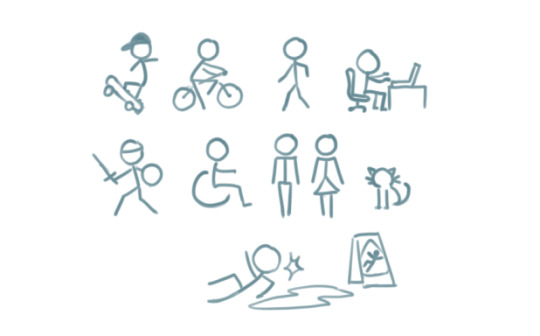
But what can a stick person teach us about drawing people that look more like… well, people? Lets have a look!
By simply adding a few more lines, we can add a pair of eyes and a mouth. Maybe even a little triangle nose! Or half circles for ears. We can now draw a face, which provides a basis for all sorts of expressions.

These simple additions can allow us to explore the wide range of human emotion and individuality.

This may seem like the basics of the basics. But that is what we want! In order to get to the point where we are able to draw complex, elaborate representations of humans and objects, we will need to start with simple shapes like lines and circles and build our understanding from there.
For instance, lets give our stick person some cool new features, such as hands and feet. I chose little squiggly circles to represent hands, and triangles to represent feet.
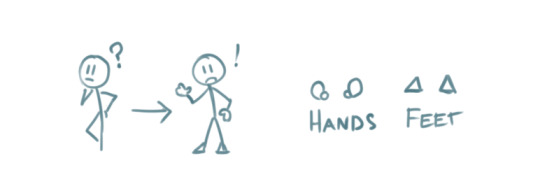
We can go a step further and modify the body of the stick person to include shoulders, hips, elbows and knees. These parts of the human body are quite complex in real life But here, all we need to do is add a few simple lines and dots to our stick person.

The lines provide some additional structural elements to our stick person's body, which are the shoulders and the hips. The dots indicate the points of articulation - elbows and knees, the places where the arms and legs bend!
Now we can use our stick person to show us an even wider range of human movement, action, and expression.

Our little drawing of a human being is evolving! All it took was adding a few more lines and shapes here and there.
By elongating some of the existing lines and making the head an oval instead of a circle, we can give our stick person proportions that resemble that of a real life human.
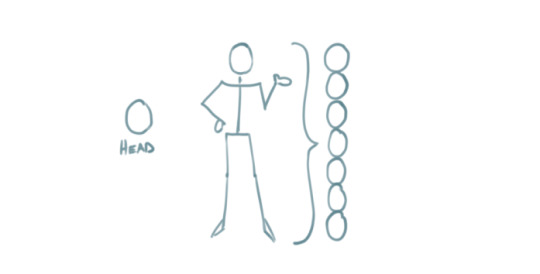
By this point, we have managed to add more complexity to our stick person simply by using our ability to draw lines, circles, and other basic shapes!
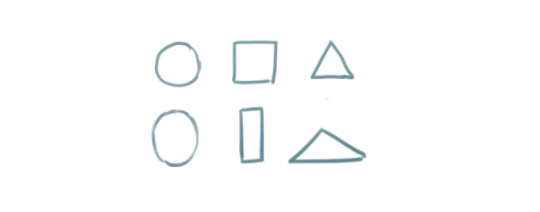
These basic ideas are the building blocks that will enable us to create more complex shapes.
The next part may be a considerable step up if you are absolutely new to drawing, but I have decided to include it in order to show you how complex objects like the human body can be built from shapes that are a bit more complex than circles and lines.
For example. Two ovals and a rectangle can be combined to create a cylinder.

Six squares can be combined to create a cube, or a box. Here, each square is distorted slightly depending on which way the cube is facing.

Note that the back faces of the cube and the bottom of the cylinder are hidden. These shapes allow us to visualize that which should not normally visible.
A sphere from all perspectives can be represented by a circle. But we can make it more like a sphere by adding lighting and shadow if we so desire.

Cubes, cylinders, and spheres are examples of 'solid shapes' because they consist of 3 dimensions.
Lets see how these solid shapes can be used to compose the human body.
By stacking three cylindrical objects, we can create a torso. Two spheres have been added to form shoulders, while a smaller cylinder forms the neck.

An arm is an alternating sequence of spheres and cylinders connected together. Note that the hand has been simplified for this example.
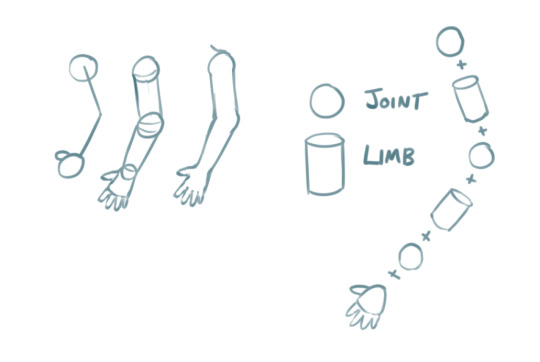
We can apply these solid shapes to the rest of the body to give us a more recognizable representation of the human form. It doesn't even have to be perfect. And just like that, our stick figure now has a silhouette that is unmistakably a person!
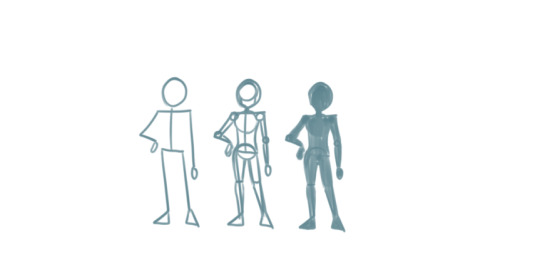
In the above examples, notice that we kept the stick person at the beginning while building up the shapes and solids around it. This is because the stick person serves as a guide for positioning the body and its various parts -> also known as posing.
You can do the same thing to everyday objects! Here, I drew a wine glass by stacking these three dimensional solid shapes.

The cup and its contents are two ovoid shapes that were cut in half. The stem is a very thin cylinder shape. The base is a cylinder with a slightly wider bottom.
Solid shapes help inform us how objects and parts of the human body may appear from different perspectives.

For example, a sphere can be used to demonstrate how the human head appears when looking up or down, turned to the side, or tilted at an angle.

With these examples, I hope I have managed to convinced you that if you can draw a circle and a couple of lines, you can draw a person! You just have to train your eye to recognize the simple shapes within complex objects. Try it with everyday objects as well! Or even your favourite media! A drawing subject can be as simple or as complex as you envision it to be.
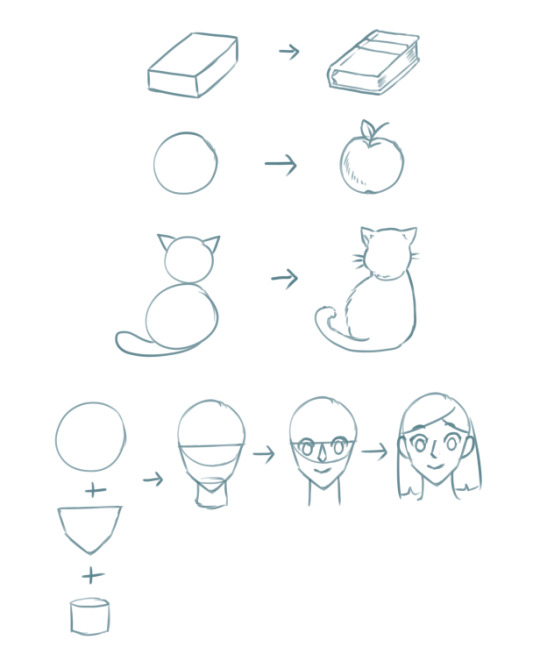
Once you have mastered that, there are many aspects of drawing you can explore from here that may require you to seek additional resources or a fellow artist's advice.

Last of all, remember that drawing is an iterative process. Even if you draw something correct the first time, you will need to draw it again and again to get it right all times! And by making small changes like the ones we explored in this tutorial, your drawings will gradually transform!
I hope what I've demonstrated here are enough to provide the basics of how to get started with drawing objects and people, and also to help refresh more experienced artists. :) Hopefully I didn't go too off topic with what was requested, and let me know if there are any more questions I can answer.
Cheers :3
33K notes
·
View notes
Text
Fly High on Aviation Day with Our Favorite Queer Books about Flying!


Today, August 19th, is National Aviation Day in the US! We asked our contributors to recommend us their favorite books that prominently feature aviation, but instead of adhering to the strict definition of operating an aircraft, we decided to expand it to piloting all sorts of flying machinery and devices, as well as riding on the backs of fantastical creatures that soar above the clouds (yes, we did get a lot of dragons). The contributors to the list are: Nina Waters, Dei Walker, Shadaras, Tris Lawrence, Linnea Peterson and an anonymous contributor.
Brooms by Jasmine Walls
The Dragonfly Gambit by A.D. Sui
Navigational Entanglements by Aliette de Bodard
Stars of Chaos by priest
The Flying Ship by Jem Milton
The Dragon by Tai Yangjun
Empress of Forever by Max Gladstone
Dragon Falls by Davis Lavender
The Angel’s Cut by Elizabeth Knox
On a Sunbeam by Tillie Walden
The Murderbot Diaries Series by Martha Wells
Temeraire Series by Naomi Novik
Find these books on our Goodreads book shelf or buy them through the Duck Prints Press Bookshop.org affiliate page.
Looking for a great place to discuss books? Join our Book Lover’s Discord server!
#duck prints press#book recommendations#rec list#queer books#aviation day#yes we're trying to do quirkier lists we crave variety okay
8 notes
·
View notes
Text

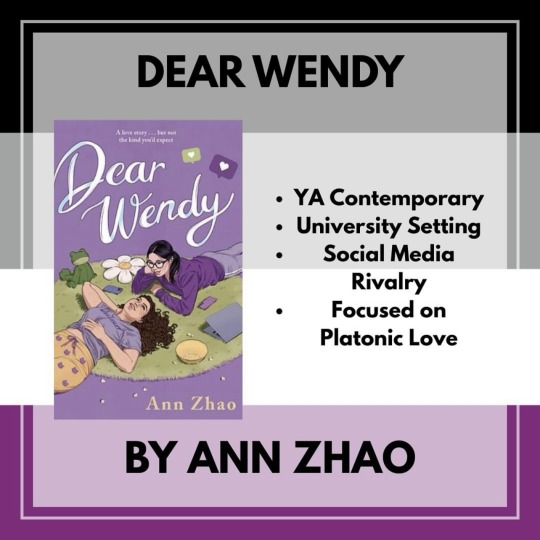
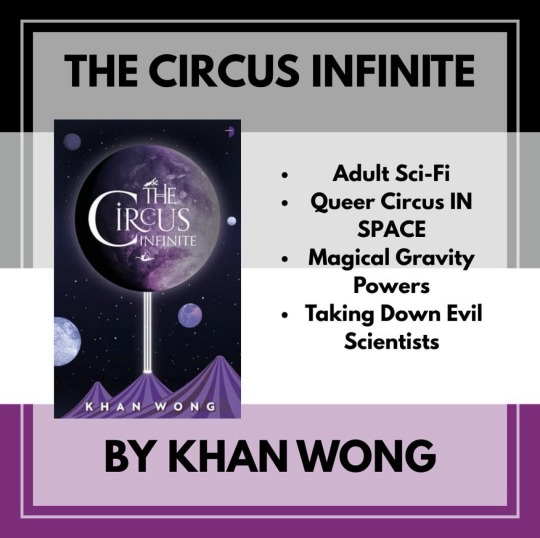
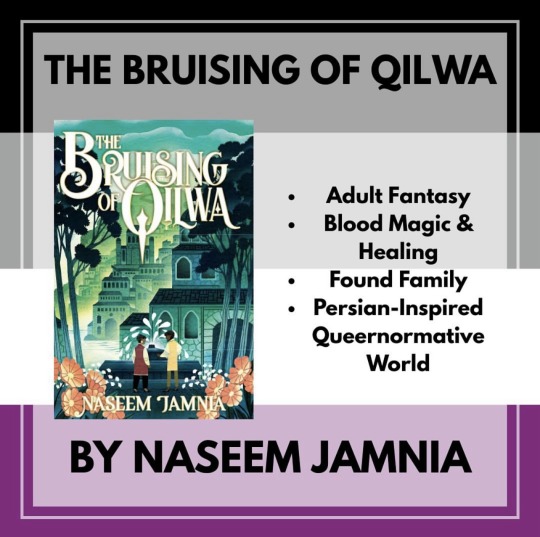
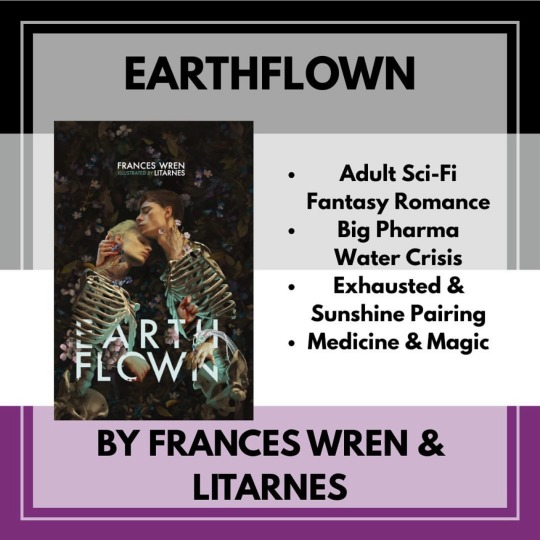

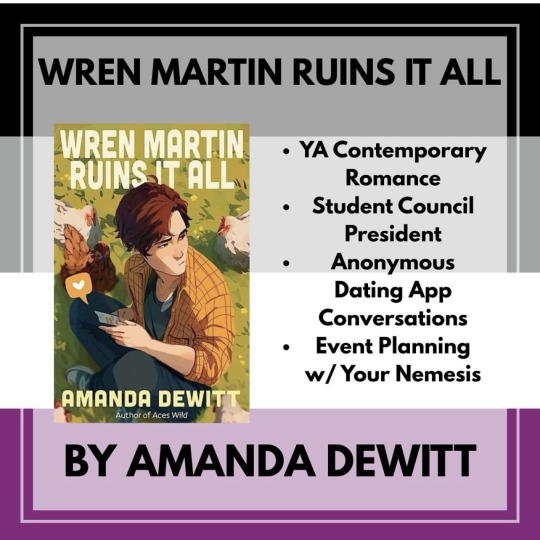
Post by foreverinastory on IG
401 notes
·
View notes
Text
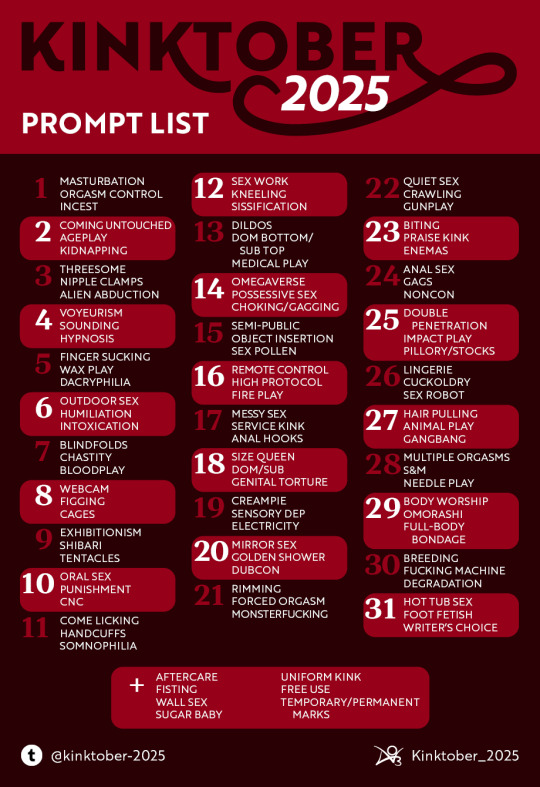
Welcome to Kinktober 2025!
As there wasn’t an official Kinktober prompt list last year, we’ve put together an unofficial one for 2025, along with an AO3 collection. The graphics were all made by @latte-cucumber, and she's also made a banner that you’re welcome to use for your Tumblr Kinktober posts:

More information
Kinktober is an October prompt challenge that’s been running in one form or another since 2016. There are three prompts for each day in October, and the challenge is to use one (or more!) of the prompts to create something for that day. If you don’t want to use any of the three daily prompts, you can swap them out for the bonus prompts at the bottom of the prompt list.
Our askbox is open for questions about how the challenge works or what the prompts mean.
Prompts
Masturbation – Orgasm Control – Incest
Coming Untouched – Ageplay – Kidnapping
Threesome – Nipple Clamps – Alien Abduction
Voyeurism – Sounding – Hypnosis
Finger Sucking – Wax Play – Dacryphilia
Outdoor Sex – Humiliation – Intoxication
Blindfolds – Chastity – Bloodplay
Webcam – Figging – Cages
Exhibitionism – Shibari – Tentacles
Oral Sex – Punishment – Consensual Non-Consent
Come Licking – Handcuffs – Somnophilia
Sex Work – Kneeling – Sissification
Dildos – Dom Bottom/Sub Top – Medical Play
Omegaverse – Possessive Sex – Choking/Gagging
Semi-Public – Object Insertion – Sex Pollen
Remote Control – High Protocol – Fire Play
Messy Sex – Service Kink – Anal Hooks
Size Queen – Dom/Sub – Genital Torture
Creampie – Sensory Deprivation – Electricity
Mirror Sex – Golden Shower – Dubcon
Rimming – Forced Orgasm – Monsterfucking
Quiet Sex – Crawling – Gunplay
Biting – Praise Kink – Enemas
Anal Sex – Gags – Noncon
Double Penetration – Impact Play – Pillory/Stocks
Lingerie – Cuckolding – Sex Robot
Hair Pulling – Animal Play – Gangbang
Multiple Orgasms – S&M – Needle Play
Body Worship – Omorashi – Full-Body Bondage
Breeding – Fucking Machine – Degradation
Hot Tub Sex – Foot Fetish – Writer’s Choice
Bonus prompts:
Aftercare
Fisting
Wall Sex
Sugar Baby
Uniform Kink
Free Use
Temporary/Permanent Marks
5K notes
·
View notes
Text

Weekly Bookish Question #454 (August 17th - August 23rd, 2025)
Optional bonus for replies: Do you like when book feature animals?
#polls#polls for readers#yes there are many animals#and also beastfolk shapeshifters with animal and human forms#cats rats a dragon a bunch of whales some wolves and more!
47 notes
·
View notes
Text
ok i need some perspective after a conversation with my friend
apply your own definition of 'fluffy', and i'd love to hear everyone's opinions in the tags!
#polls#polls for readers#i mean if i didn't want a fluffy book why would i be reading a fluffy book?#but it can depend a little on my mood and stuff#but it still wouldn't be a waste of time ever#it'd just be this wasn't the book i wanted at this moment
140 notes
·
View notes









